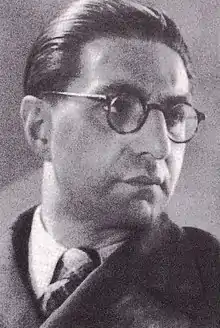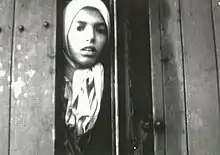Rudolf Breslauer | |
|---|---|
 Breslauer in the 1930s | |
| Born | Werner Rudolf Breslauer 4 July 1903 |
| Died | 28 February 1945 (aged 41) |
| Nationality | German |
| Known for | Photography |
| Website | Biographic details |
Werner Rudolf Breslauer (4 July 1903 – 28 February 1945) was a German photographer of Jewish descent.
Leipzig, the Netherlands, Westerbork, Auschwitz

Breslauer was born in Leipzig, where he was trained as a photographer and as a printer. In 1938, he fled to the Netherlands, where he lived and worked in Leiden, Alphen and Utrecht.[1] In 1942, Breslauer, his wife Bella Weissmann, sons Mischa and Stefan and daughter Ursula were imprisoned and deported to Westerbork transit camp. Camp commander Albert Konrad Gemmeker ordered Breslauer to make photographs and films of life in Westerbork.[2] Breslauer and his family were transported to Auschwitz in the autumn of 1944.[3] His wife and two sons were immediately killed, Rudolf Breslauer died a few months later. Their daughter Ursula survived the war.
Photographs, stills and a film from Westerbork, by Breslauer
The German camp commander, Albert Gemmeker ordered Breslauer to document everyday life in the Westerbork transit camp. In 2017, these films were submitted by the Netherlands and included in UNESCO's Memory of the World Register.[4]
 Settela Steinbach May 19th 1944
Settela Steinbach May 19th 1944![Christmas 1942 in Westerbork (from left to right) Albert Konrad Gemmeker [de], Hassel, Aus der Fünten and Scheltnes of Lippmann, Rosenthal & Co.](../I/FAusDerFunten.jpg.webp) Christmas 1942 in Westerbork (from left to right) Albert Konrad Gemmeker, Hassel, Aus der Fünten and Scheltnes of Lippmann, Rosenthal & Co.
Christmas 1942 in Westerbork (from left to right) Albert Konrad Gemmeker, Hassel, Aus der Fünten and Scheltnes of Lippmann, Rosenthal & Co. Hanukkah in Westerbork
Hanukkah in Westerbork- Transport to Auschwitz (Westerbork movie)
 Train: No carriage ..... Train must be closed when returned to Westerbork
Train: No carriage ..... Train must be closed when returned to Westerbork
References
- ↑ "Werner Rudolf Breslauer". www.joodsmonument.nl.
- ↑ Website Auschwitz.nl
- ↑ "Rudolf Werner Breslauer". www.biografischportaal.nl.
- ↑ "Westerbork films". Memory of the World. United Nations Educational, Scientific and Cultural Organization. Retrieved 9 October 2018.
External links
 Media related to Rudolf Breslauer at Wikimedia Commons
Media related to Rudolf Breslauer at Wikimedia Commons- The Westerbork movie by Rudolf Breslauer in 1944. NPO-Geschiedenis, May 2011 (Four short movies and two films with loose footage)
- Holocaust Encyclopaedia: Westerbork